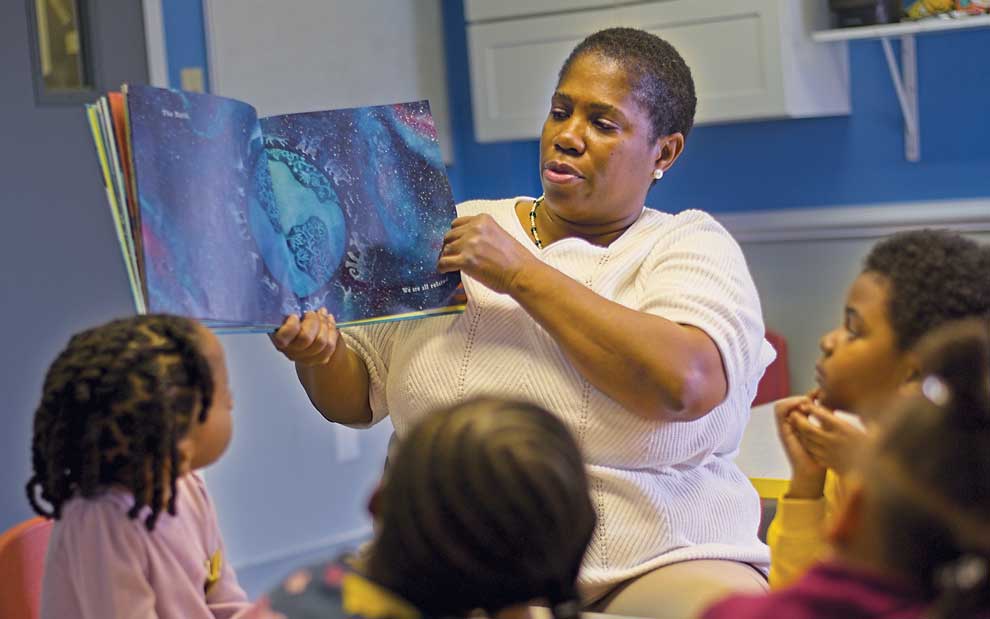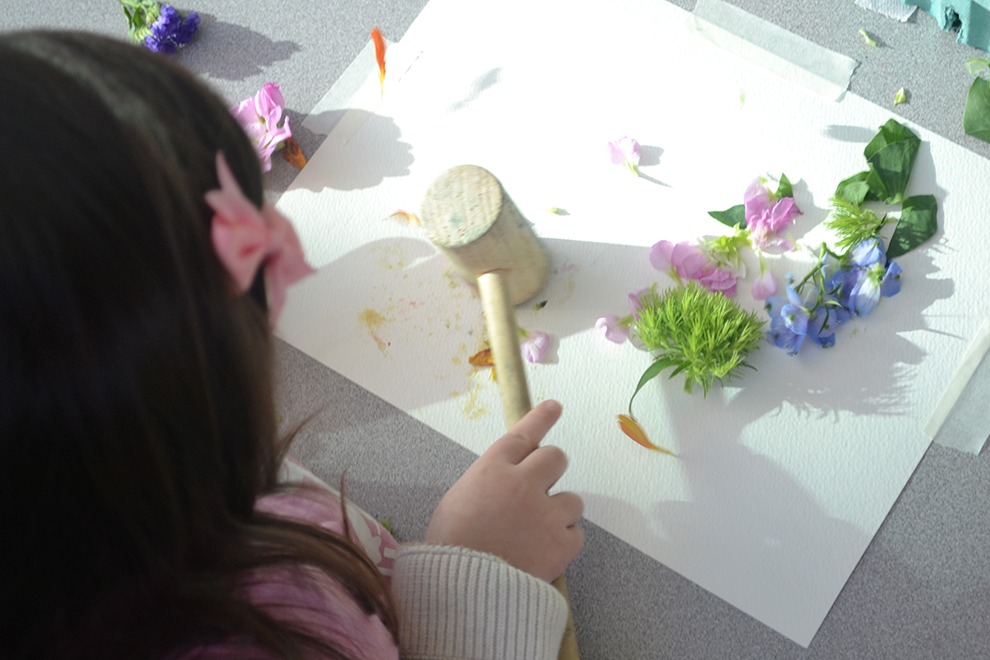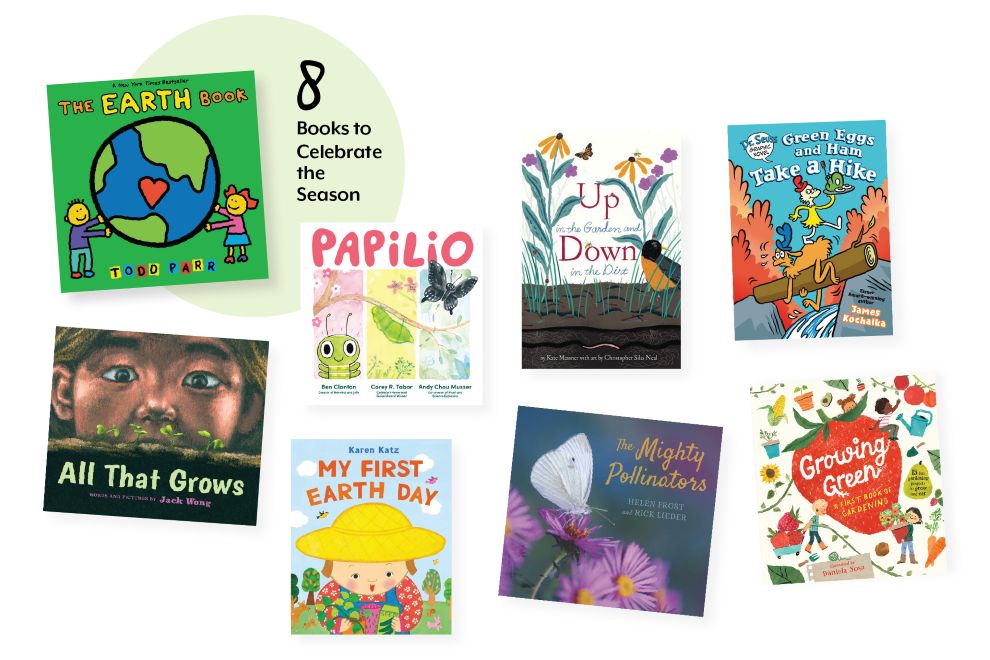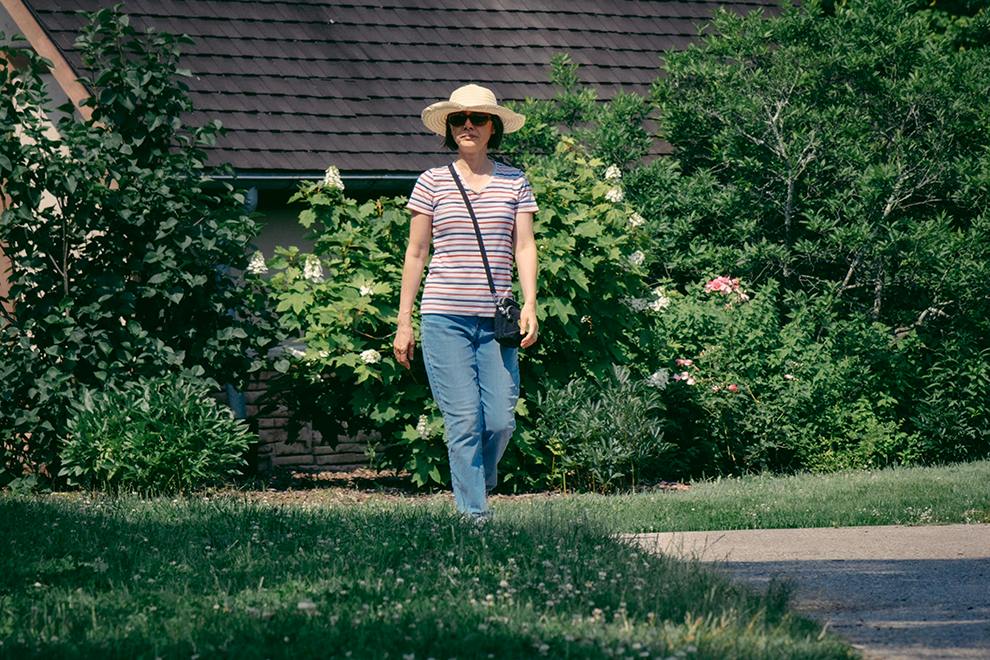Working parents didn’t need a pandemic to learn the importance of having reliable child care for their children, but the pandemic certainly demonstrated the essential and critical role early childhood caregivers play in educating and shaping future generations.
“The child care workforce supports every other workforce in Virginia,” says Angela Wirt, executive director of Child Care Aware of Virginia, a nonprofit that helps parents find child care providers. “They’re the reason we can go to work or school. They’re the reason our economy is able to operate. They support kids’ education and social development in helping them get ready for school.”
But who’s teaching the teachers? That’s where ChildSavers comes in.
Founded in 1924, ChildSavers is a nonprofit that’s been working to support children and their families from the start. Originally called Children’s Memorial Clinic, the organization’s purpose was “[to give] complete physical and mental examinations, free of charge, to all children who may need the same,” according to its website.
Over the years, ChildSavers has developed and evolved programming to meet the needs of the community. Now, ChildSavers is doubling down on quality early child care and children’s mental health. With three divisions – mental health services, child development services, and trauma and resilience training – the organization seeks to help our youngest citizens and everyone connected to them: parents, child care providers, teachers, health care professionals, and community leaders.
“We have developed a ‘prevention/intervention’ approach toward childhood trauma, combining nurturing early childhood care training to prevent trauma from occurring, and intervention with our expert mental health services team when trauma does occur,” says L. Robert Bolling, ChildSavers’ CEO. “In partnership with children, families, and child care providers, our staff works around the clock to ensure the community can count on us to provide a comprehensive, tailored approach to help children thrive.”
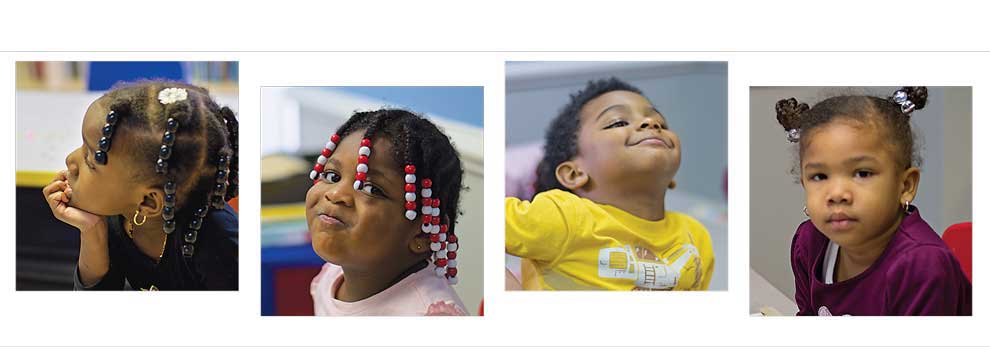
Instructing Child Care Providers
For more than twenty years, Child Care Aware, an independent nonprofit, has contracted with the Commonwealth of Virginia to provide child care referral services to parents who ask for assistance. “At this point, providing a child care resource [for state citizens] is a federal mandate,” Wirt notes.
Child Care Aware also supports providers with information about state regulations, how to run a business, and how to seek the ongoing training that state licensing requires. Every year, preschool teachers must take sixteen hours of instruction, a mandate monitored through the Department of Education Office of Child Care Health and Safety.
“There’s no list of approved training, so it really is up to the licensing inspector to decide what training counts and what doesn’t,” Wirt says.
Given the variety of training opportunities that are available to caregivers – including online videos – it’s important to have confidence in what’s being provided, Wirt says. That’s where ChildSavers has a track record of quality. “ChildSavers was a founding partner in [the Child Care Aware] network,” Wirt says. “They’ve really just been one of the most consistent and one of the most dedicated partners we’ve had throughout our history. They’re a pleasure to work with, dedicated, and involved. They’re a good resource for us to lean on.”
Lisa Thompson, senior program manager for ChildSavers’ child development services division, notes that the organization’s class offerings are designed not only to give providers the opportunity to take classes they need, but also to take classes that are relevant to the issues they are seeing in their classrooms and facilities. “We offer a quarterly calendar because we want [the class list] to resonate with providers according to their needs at that moment,” Thompson says. For the current fiscal year ending June 30, 2024, ChildSavers aims to offer 300 training sessions; by last December, 173 were already complete.
ChildSavers divides training sessions into two provider groups: those who work with children from birth to age five and those who are working with children in a school setting up to age twelve. Thompson says many people come to the organization with an interest in providing child care services but don’t know where to start.
“We help [potential child care providers] with business acumen, training, and the health and nutritional opportunities for children [from state and federal sources],” she says. “We help them with the pathway.”
Many classes are offered on an ongoing basis, given high demand for topics such as brain development in infants and toddlers, art and music instruction, nutritional needs and meals, and supporting active physical play. Those who attend classes are asked to complete customer satisfaction surveys, which yield feedback and suggestions for other topics. “We don’t just collect this data; we look at this data,” Thompson says, noting that recent responses have asked for classes on how to manage provider self-care and how to work with children who are on the autism spectrum. “If we don’t have the skill set [that’s requested], we try to find community resources to offer them,” she adds.
ChildSavers also offers the training required to acquire a Child Development Associate (CDA) credential, which may be obtained through a national certification process. The CDA includes thirteen modules, more than one hundred hours of training, and a prepared portfolio.
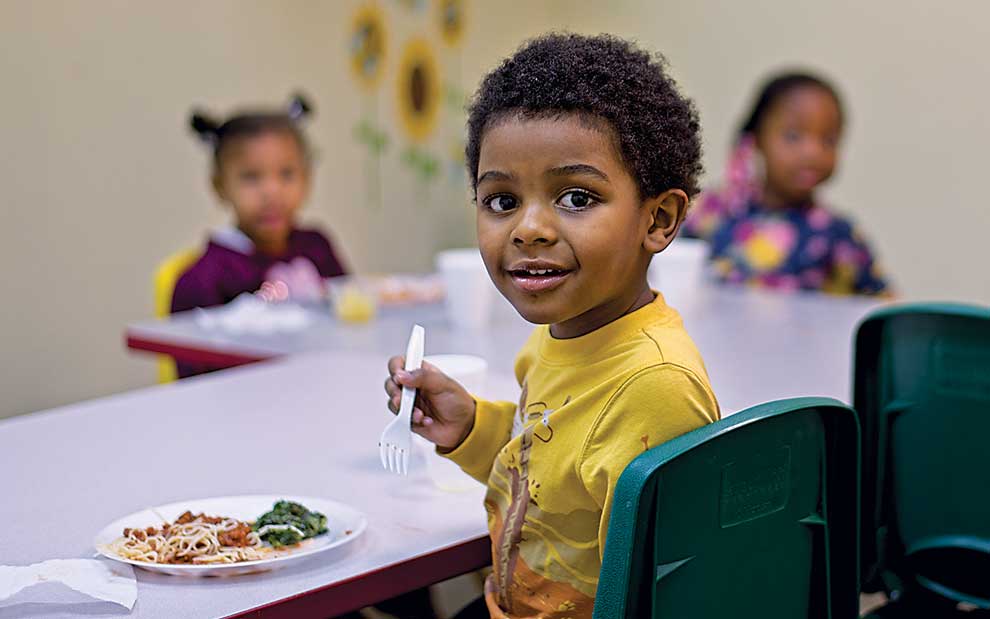
Building Community Relationships
While classes are important, ChildSavers knows more is needed. “Our child development services team strives to build very strong relationships with the providers that we work with, year after year,” she says. “Providers trust that our trainers are not only going to be knowledgeable but also authentic and relatable.”
Thompson estimates that seventy percent or more of class participants are repeat customers. Training continued during the pandemic because ChildSavers had already offered limited online training, though not with a live instructor. “That was the one thing that blossomed out of the pandemic: virtual learning,” she notes.
ChildSavers expanded the window in which classes were offered, adding Saturday nights and Sundays, seeking to help child care providers with times that worked for them. While the weekend sessions have largely ended, some classes are offered midday or in the early evening. “We want to make sure the children aren’t being overlooked while a teacher is in a class,” Thompson notes. “It’s a delicate dance for us to offer training so we can have the teacher’s full attention.
“The sad part is that most of these child care providers don’t have professional development funds or tuition assistance; it’s coming out of their own pockets, and they’re already making little,” Thompson says. “But they want to arm themselves to do what’s best for the children.”
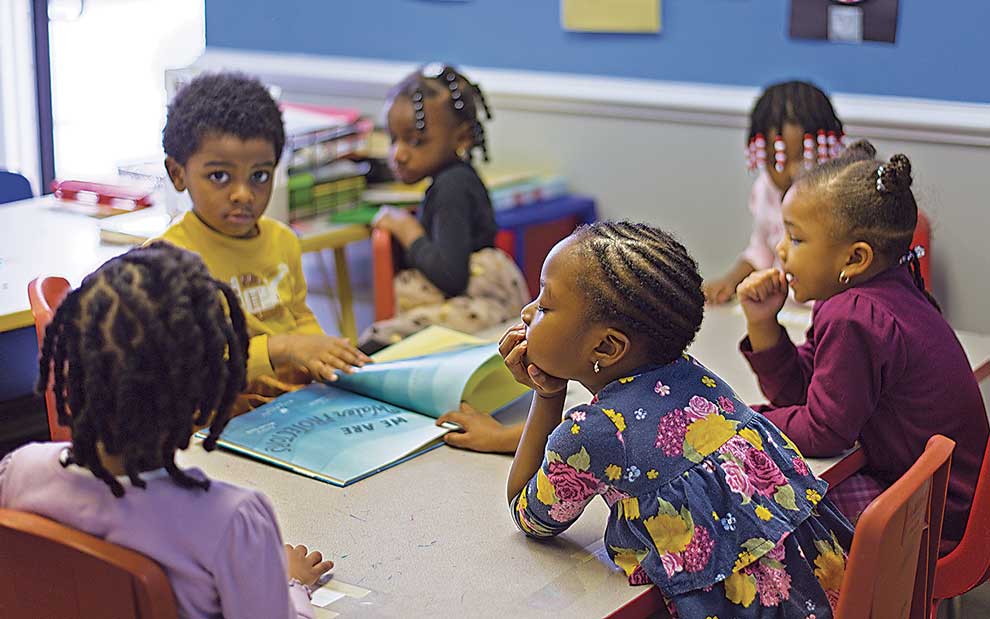
Finding Solutions with Providers
Raquel Evans, who began working in the infant room at Crossroads Christian Academy of Prevailing Word Ministries in 2017, soon realized she needed additional education. “Being a mom is great, but my children were nearly four years apart [in age] and grown when I started,” she says. “Being a mom of infants is definitely different than being a teacher of infants. What people don’t realize – what I didn’t realize initially – is that we’re not babysitters, we’re educators.”
Early on, Evans sought training through the Virginia Infant and Toddler Specialist Network and eventually found ChildSavers, where she’s now working toward earning her CDA credential. “I’m positive you could get the same information elsewhere, but that’s [going to cost] more money,” she says. “I’m getting a quality education, just as I have with every [class] I’ve taken at ChildSavers.”
One advantage of in-person classes with ChildSavers, she says, is the possibility to learn from other caregivers. “In class, you sit there and realize you’re not alone,” Evans says. “You can bring up a situation, a day, a topic, and you can get an answer. Everyone’s environment is different, but it’s very beneficial to be around [other caregivers].”
Additionally, she says, the staff at ChildSavers is committed to working with child care providers when needed. After Evans learned that a child in the preschool had experienced trauma at home, she reached out to ChildSavers for guidance. “I gave them the scenario, respecting confidentiality, told them my concerns, and they sent a team out to observe me and the child,” she says. “I was able to get a recommendation [specifically for] my classroom.”
Evans is now director of Crossroads Christian Academy, which no longer provides infant care, instead choosing to focus on school readiness for children ages two-and-a-half to five using a streaming curriculum with language arts, math, science, and arts instruction. She says the Unified Virginia Quality Birth to Five System (VQB5), a program developed by the Department of Education to measure and improve the quality of preschool instruction, is helping preschools and child care providers throughout the state.
“People don’t understand how important early childhood education is; we’re not day care,” Evans says. “We are observed to make sure we’re starting firm communication, giving our children a firm foundation. Here, we want to make sure we are providing a safe environment and strong foundation to nurture their development. Children teach us every day.”
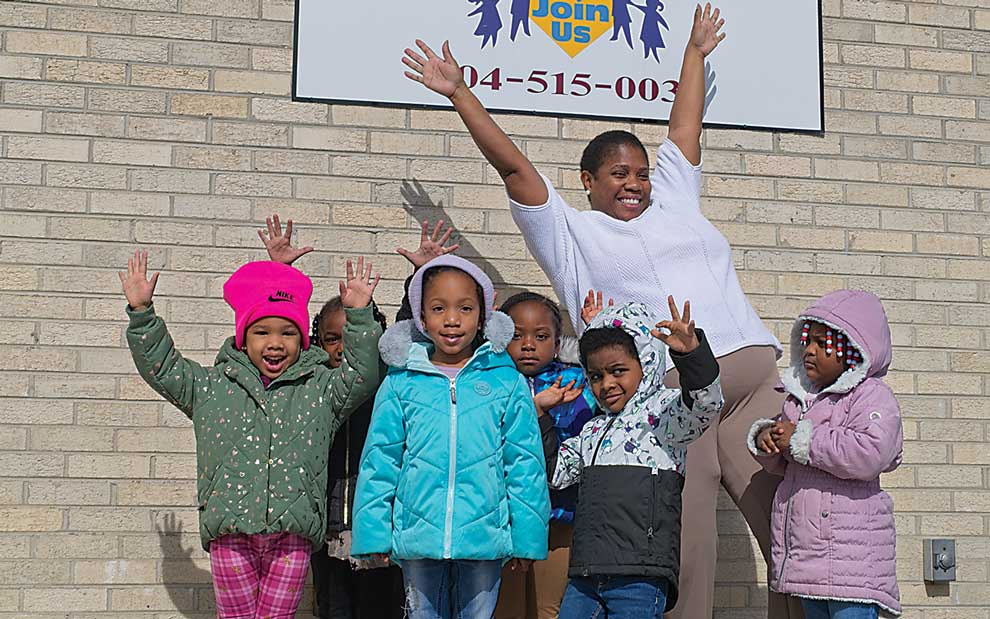
Providers and Parents in Tandem
Wirt, with Child Care Aware, encourages parents to regard their child care providers as partners in their children’s upbringing, noting that because of their ongoing training requirements, paid caregivers might be in a position to know more about current protocols than the parents themselves.
“If parents don’t have other relatives nearby, their child care provider can be someone who they grow close to, lean on, [someone who] helps them learn about parenting and learn about their child,” Wirt says. “A new parent might not know about safe sleep practices. They might be a better, safer parent because their provider tells them something that helps them be a better parent.”
In order to help parents, ChildSavers’ Thompson notes that child care providers need help themselves. “We have many examples of providers texting us, saying, ‘I just need to have someone I can talk this through with,’” she says. “We’ve even gone out on visits, and we find ourselves almost putting aside the original purpose of the visit to talk with [a provider] or walk them through a situation.”
While news coverage during the pandemic highlighted the stresses experienced by workers in many essential industries, child care providers continue to struggle, Thompson says. “The early child care industry has always been thought of in a not-ideal manner,” she says. “The pandemic heightened that crisis, and you now have child care professionals who are still doing their best to show up every day, to be actively involved with the children who are in their care. They are stressed because they are constantly fighting to be seen as equals when it comes to the workforce.”
Wirt notes that many child care locations are still struggling to fill staff roles. She recently heard of one provider who has two classrooms sitting empty because he can’t find workers to fill the jobs. Thompson acknowledges that child care tuition seems high to parents, but “that tuition is being divided in thirty ways,” she says, “The actual providers themselves are not getting paid what they should.”
As a nonprofit, ChildSavers strives to offer its services at a lower cost than for-profit businesses, using a combination of grants and philanthropy to support its mission. “We recognize that [about] the training we offer – if we want to make sure the child care providers who need it the most can attend, we need to make it economical for them,” Thompson says. “Early care is still one of the largest underpaid industries.”
Thomson adds that she hopes stakeholders will come to recognize the work of child care providers and how it impacts communities. “They’re not babysitting; a lot goes into child care. It’s wonderful work. Anyone who is working in child care is bestowed with the most precious gifts that anyone can ask for – these little beings we are helping to shape to be lifelong learners and productive citizens.”


